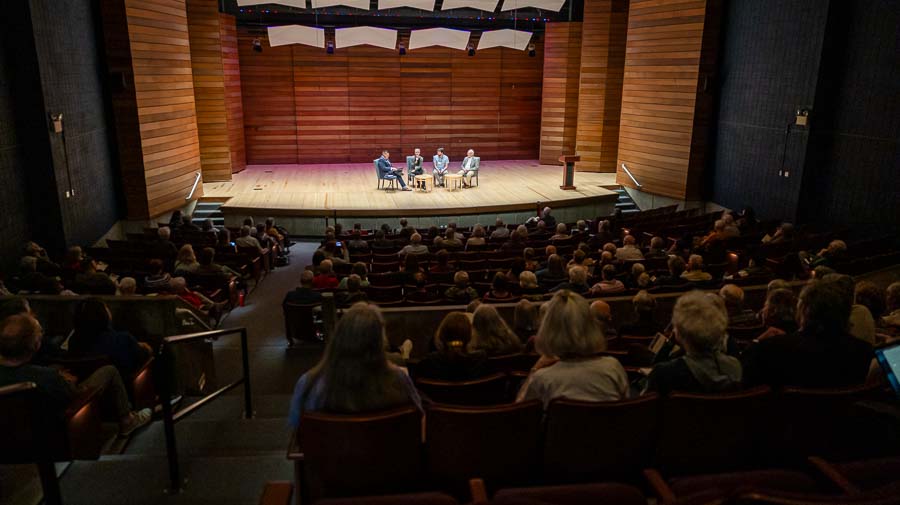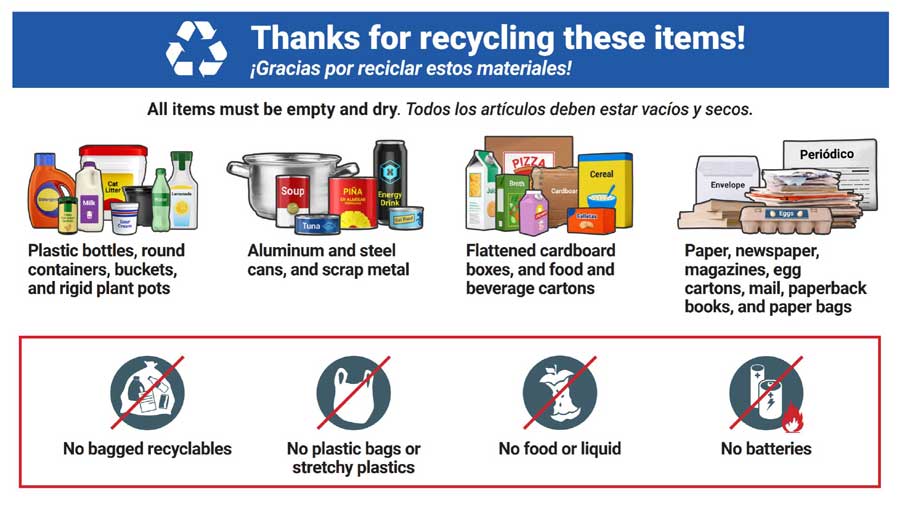About 300 people viewed the documentary, “Stripped for Parts: American Journalism on the Brink,” which describes how hedge funds have systematically gobbled up newspapers, sold off most of their assets and decimated newsrooms — all to keep the profits rolling in.
“I need to be honest,” said David Sommers, a board member of Ashland.news. “This is a depressing film that we’re about to watch.”
Ashland.news hosted the event in SOU Recital Hall along with partners SOU Communication, Media and Cinema and the University of Oregon, Agora Journalism Center. Sponsors of the event included Grizzly Peak Winery and Rogue Valley Metaphysical Library.
Sommers, who formerly was publisher of the Rogue Valley Times and chief revenue officer of EO Media, moderated the panel discussion at SOU Recital Hall after the showing of the film.
The panelists were Ryan Haas, news content manager with Oregon Public Broadcasting, Regina Lawrence, associate dean of the University School of Journalism and Communication, and Bert Etling, editor of Ashland.news.
Most Popular
Lawrence told the audience, “A huge shoutout to Ashland.news. Look at the turnout we have.”
The film described how hedge funds took control of many legacy newspapers, sold off assets, including their buildings, and made severe cuts to newsrooms. In the past 20 years, 2,000 newspapers have shuttered across the country, creating news deserts and resulting in more attention paid to national news and less to local news.
Many newsrooms fought back against the hedge fund takeovers and investigative journalists delved into the corporate structure of the hedge funds, which the documentary describes in detail.
At the same time, former journalists have been experimenting with other models to keep newspapers going.
Meanwhile new threats arose such as online news scrapers and the rise of artificial intelligence, as well as huge corporations such as Google and Facebook that scoop up articles from the remaining local and national newspapers.
After the demise of the Ashland Daily Tidings, Etling, its former editor, helped launch Ashland.news in 2022.
The Tidings circulation had dropped to 1,400 before it closed, Etling said. Ashland.news, a nonprofit, has a subscriber base of 5,300.
“That’s a ton,” he said. “We’re three times as big as the Tidings was.”
Etling said he’s seen growth nationwide in a nonprofit model for newspapers, similar to Jefferson Public Radio or Oregon Public Broadcasting.
“The capitalistic model is dead,” he said.
He said Ashland.news’ mission statement as a nonprofit is to serve the community’s interest by offering news stories, feature stories and listing events, all of which help knit a community together.
Etling said, “When community newspapers are gone, there is less community engagement.”
While Ashland.news has garnered community support, Etling described a new threat.
The defunct Ashland Daily Tidings has resurfaced as a fake online website, scooping up local stories, repackaging them through an artificial intelligence program, and even using a byline of a person in England, who didn’t write the story and had nothing to do with the website.
Etling said a reader one day called to complain about some information in an article, but it turned out the reader was actually looking at the Tidings website, not the Ashland.news website.
Haas, with OPB, wrote a story about the fake Tidings website after he saw one of his articles appearing on the Tidings site.
“It looks like they stole my story,” he said. “They published it as if it was original reporting.”
Haas, who said he uses AI to help gather information about his own articles, said AI is creating a new problem for existing news organizations.
“It is another threat to journalism,” he said.
Lawrence, with the University of Oregon, said many people take journalism for granted.
She said local news gathering matters more than people realize.
With news deserts popping up around the country, people are more likely to be drawn into national news, she said, which tends to foster political polarization.
At the same time, Lawrence said they lose touch with what’s going on in their own community.
She said local news is important because it keep local communities together.
Haas said St. Helens, north of Portland, has been rocked by controversy, including child sex scandals, detailed in an OPB article in December 2024.
He said this community lacks the kind of news coverage that it previously had.
“People in the community say they didn’t know how much they miss local journalism,” Haas said.
A number of hedge fund takeovers have rocked newspapers across the country, with new corporations rising up and following the lead of the bigger outfits such Alden Media, a large hedge fund.
Mississippi-based Carpenter Media Group acquired Oregon-based Pamplin Media and EO Media last year and layoffs and selloffs of buildings followed.
Sommers said, “Is Carpenter the next Alden Media?”
Haas responded, “We don’t need to anticipate,” pointing out that Carpenter has already laid off reporters. The Rogue Valley Times and Bend Bulletin were among the papers affected by the layoffs.
Shortly after the move into Oregon, Carpenter announced it was selling off the headquarters of The Astorian and the Blue Mountain Eagle.
Lawrence said newspapers are in a very economically vulnerable position now.
“So much depends on how Carpenter operates these papers,” she said.
While a nonprofit model such as Ashland.news thrives in a community with a favorable demographic such as Ashland, Lawrence said it might not thrive elsewhere.
“Other communities might not have the underlying economics to support that,” she said.
Lawrence said journalism will continue to experiment with new economic models going forward. She said other countries provide more government funding for public media than the U.S. does.
The panelists described four pieces of legislation before the Oregon Legislature this session that could provide a lifeline to struggling news operations.
Lawrence said one of the bills is designed to make platforms such as Google pay for the content they are leveraging.
Etling said it pays off when journalists go find information and report it to people.
Speaking to the audience, Etling said, “What gives me hope is all of you.”
Reach freelance writer Damian Mann at dmannnews@gmail.com.














